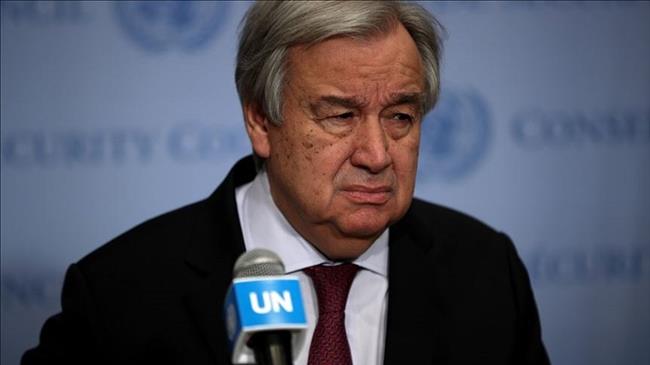UN chief warns of biological terrorist threat amid pandemic
The head of the United Nations has called for unity among Security Council members, warning that the coronavirus pandemic could pose a threat to world peace or trigger opportunistic biological terrorist attacks.
Speaking at the international body's first meeting on the pandemic, the secretary general, Antonio Guterres, said the outbreak had the potential to increase social unrest and violence.
The meeting, the first of its kind since the outbreak began in China late last year, was held behind closed doors by video conference.
“To prevail against the pandemic today, we will need to work together," he said. "That means heighten,” he said on Thursday.
The novel coronavirus, which causes a respiratory illness — dubbed COVID-19 — has infected more than 1,600,000 people and claimed the lives of over 96,000 others globally, as of Friday morning, according to data collected by Johns Hopkins University.
The pandemic has confined billions of people to their homes and pushed the world into a recession.
“A signal of unity and resolve from the Council would count for a lot at this anxious time," Guterres added.
He described the war against coronavirus as “the fight of a generation - and the raison d'être of the United Nations itself.”
Guterres stressed that the world body’s involvement would be “critical to mitigate the peace and security implications” and “a signal of unity and resolve from the council would count for a lot at this anxious time.”
He further warned that the pandemic could lead to opportunistic terror attacks across the globe.
He said that terrorists are seeing the pandemic as “an opportunity to strike, groups seeing how a biological terrorist attack might unfold” and that the epidemic was “triggering or exacerbating various human rights challenges.”
After the meeting, the Security Council broke its silence and issued a statement on the coronavirus outbreak.
It expressed “support for all efforts of the secretary general concerning the potential impact of the Covid-19 pandemic to conflict-affected countries and recalled the need for unity and solidarity with all those affected.”
Amid the call for unity, the United States stoked up yet another coronavirus row earlier this week, accusing the World Health organization (WHO) of being “China centric” and “biased” towards Beijing.
President Donald Trump said Wednesday that the WHO had “been wrong about a lot of things, and threatened to put a hold on WHO funding.
When asked if that was a good idea during a pandemic, Trump denied saying it, and then said they would “look at it.”
The WHO declared a “public health emergency of international concern” at the end of January. Almost one month later, Trump said in a Tweet, “The coronavirus is very much under control in the USA.”
The US, now has become the epicenter of the disease with 466,033 positive cases of infection and more than 27000 deaths, compared with nearly 83,000 cases in China and 3,337 deaths.
Gutterres also warned that the pandemic “poses a significant threat to the maintenance of international peace and security – potentially leading to an increase in social unrest and violence that would greatly undermine our ability to fight the disease.”
He said, “The weaknesses and lack of preparedness exposed by this pandemic provide a window onto how a bio-terrorist attack might unfold - and may increase its risks.”
His calls for unity, however, came in contrast with US unilateralism and the Trump’s policy of maximum pressure against various countries.
Last week, the United Nations General Assembly approved a resolution calling for “international cooperation” and “multilateralism” in the fight against the pandemic.
The assembly, however, failed to approve a draft resolution, proposed by Russia, that was calling for an end to trade wars, protectionist and US unilateral sanctions on countries across the world.
The resolution called for a general lifting of international sanctions that hamper efforts to fight the coronavirus outbreak.
The European Union, United Kingdom, United States and Ukraine objected to the draft.
At a time of the pandemic, world leaders have repeatedly called for a suspension of US economic sanctions on some countries.
Trump, however, insisted that his administration would continue with its policy of maximum pressure against various countries, including Iran, Iraq and Venezuela.
IMF: world faces worst crisis ever
Meanwhile, the head of the International Monetary Fund said the pandemic has spawned an “economic crisis like no other.”
Kristalina Georgieva said Thursday that the world should brace itself for "the worst economic fallout since the Great Depression."
The world’s poorest countries will suffer the most, she said.
She said that the IMF will release an updated world economic forecast on Tuesday that will show just how quickly the coronavirus outbreak has turned what had been expected to be a solid year of growth into a deep downturn.
VIDEO | Press TV's news headlines
Israeli strikes on north Gaza hospital ‘extremely dangerous, terrifying’: Director
VIDEO | Yemen targets Tel Aviv with Palestine 2 missiles
Pezeshkian: Iran resolved to complete North-South Transport Corridor
VIDEO | Iran-Syria: For Resistance
Qassam Brigades claims killing 3 Israeli troops in northern Gaza
More alive than ever: Sayyed Hassan Nasrallah's legacy grows stronger in martyrdom
Occupation of Syria’s highest peak Mount Hermon part of ‘Greater Israel’ project













 This makes it easy to access the Press TV website
This makes it easy to access the Press TV website